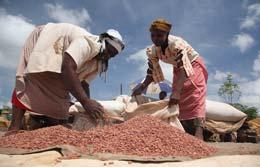Let's work together for global food security

Guest Commentary
By Archbishop Fred Hiltz
Anglican Church of Canada
I often speak about various issues and events that are having an impact on local communities here in Canada, whether this is the flooding experienced in Calgary, or a fundraising initiative for a local Church. Life-threatening problems outside Canada are also expected to affect us significantly – and international food security is one of these.
My role as Archbishop of the Anglican Church of Canada – and as the president of the Church's official initiative, The Primate's World Relief and Development Fund (PWRDF) – is to bring communities together, inspire positive change, and encourage involvement. This can take a number of different forms; in some cases Church go-ers are compelled to get involved by volunteering their time and skills, while others support a cause through financial donations. At the end of the day, what matters is that the community responds and becomes engaged – this is what it is all about.
With so many human and environmental issues here at home, it can be difficult to look past the confines of our own backyard to places like Mozambique or Haiti, but as a global community it is our responsibility to maintain a greater sense of awareness and establish connections with those in need of help. As mentioned, an issue that is common to communities around the world and something that continues to be a focus for me and the Church is food security and sustainability.
What do I mean by 'food security'?
It is not a term well understood by most, but it refers to the availability of food and one's access to it. Food security is vital and without it, people may not be able take medicine, sleep, go to school, work and generally contribute to society. Food and nutrition are fundamental for positive physical and mental health, fueling community growth and prosperity.
For the average Canadian, it may seem impossible to have any impact on such a massive issue like international food security, but that is where I need to remind everyone that no matter how big a challenge is or may appear to be, getting involved and making a contribution is key. Everyone has their own definition of 'commitment' and I encourage those contemplating involvement to do so in a way that makes them comfortable. At the end of the day, as long as we are engaged in the issue, we will make a difference.
PWRDF approaches the issue of food security in the same way I encourage Canadians: every action counts. I am often known simply as Fred and personally, this issue is so important to me now I've become the 'face' of a new campaign – Fred Says – that places a 'unique' spotlight on food security and highlights four PWRDF projects that are having an impact and improving lives at a local level by working to ensure community members have access to good, nutritious food all year round.
Over the next eight months we will be profiling a number of projects dedicated to making a difference when it comes to food security and encouraging support from the community. For example, in presenting the EHALE program for AIDS patients in Mozambique, I ask; Have you eaten today?
For Canadians, I hope to provoke some thought. Why might I be asking this question? For these patients suffering from the AIDS virus, ensuring they've eaten and are nourished is vital, since without food the anti-retroviral medications can cause someone to be ill and in some cases, even die. We are looking to make meaningful impacts on the lives of 600 more AIDS patients living in Mozambique.
This is an achievable goal that does many things: It ensures that patients have access to food so that they can take their medicine; it inspires the global community to recognize that it all starts with food; and, that by reaching out we can all help to make a difference. We can have a positive impact and change the lives of those in need.
Three other projects that highlight the food security issue will be shared throughout 2014 with each demonstrating what can be accomplished when global communities become involved. Whether it is a 'train the trainer' program designed to teach Cubans the art of farming, canning and preserving foods, or training families in East Africa on sustainable farming techniques to overcome poor soil conditions, it all points to the larger message of engagement and supporting communities both here in Canada as well as those around the world.
More information is available online at www.fredsays.ca or www.pwrdf.org.
Leave a comment









